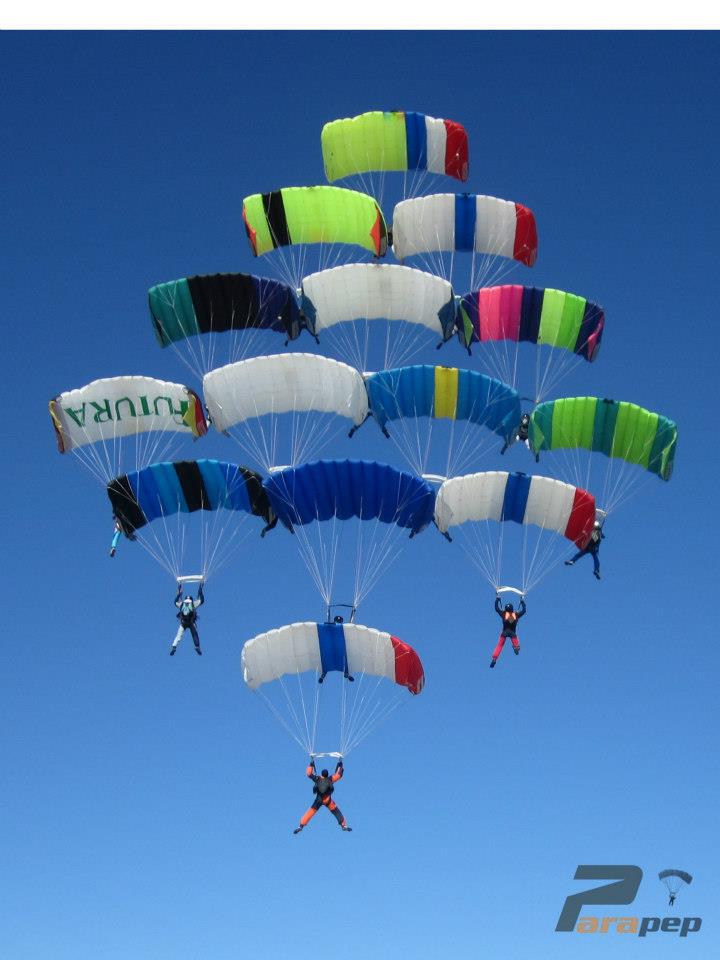Baksteen 84
Sorry.
Popsjumper, I have actually thought about it extensively.
I was merely pointing out that 'scary' medical issues are not always an insurmountable obstacle. When we're not in possession of the facts t's all too easy to jump to a conclusion. Who are the "we" who found out? The staff? S&TA? DZO? The rest of the jumpers?
On the other hand, how much medication is she taking? Which kind? How long? Are there side effects? What are her triggers? How long ago was her last seizure? what kind of seizures does she have? Without knowing these facts we can't even say whether it's even necessary that she talks about it.
I made a post about my actions and motivations here.
While I choose to be open about it and would advise other people not to hide any medical conditions at least to their S&TA or equivalent, I certainly can understand why people would choose to do so.
You know how some whuffos react when they find out about skydiving: "What? You crazy MOFO!!"
You know how annoying that is, having to explain over and over again that you're not suicidal, that it's fun and whatever.
They react to the Hollywood-generated stereotype of skydiving without having any relevant knowledge of the subject.
Now imagine that people try to "protect" you from yourself. They watch out for you or treat you like a small child, since the only thing they know about (in this case) epilepsy is that "those people" will start shaking uncontrollably at completely unpredictable times. You'll encounter this attitude at every level - including those who should know better, like some medical professionals..
Would you want people to view you that way?
I know now that most people won't, but that fear is still there everytime I 'confess' having epilepsy. And thats with the last seizure in early 2002. However close I am with the person, however much I respect them, part of me is always afraid that their behaviour towards me will change.
Some skydivers, for instance, will be convinced I am a safetyhazard in the air, both to myself and any other person on the load and therefore refuse to be on the plane with me.
That has been a major worry for me, the first year I jumped.
So why fess up over the net?
Finding out I'm not the only one has helped me tremendously. Maybe telling my story in turn will help another person or at the very least will decrease knee-jerk reactions...and like I said, people are more understanding than I initially thought, most do not think any less of me after they found out.
If only I'd known this sooner....
EDIT: The prejudice about epilepsy was especially a problem in the bad old days - like the eighty's....
~mom
Quote...When we're not in possession of the facts t's all too easy to jump to a conclusion.
That's the point, alright. Not knowing about ANY medical issues would lead one to think that everything is hunky-dory when in fact, it could be anything but.
Listen, I understand your thoughts on people's perceptions. That's not the issue here. It's not a matter of perception. It's a matter of safety. Period.
QuoteWho are the "we" who found out? The staff? S&TA? DZO?
Hopefully all of the above. Whoever it was found out a little late in the game don't you think?
QuoteOn the other hand, how much medication is she taking? Which kind? How long? Are there side effects? What are her triggers? How long ago was her last seizure? what kind of seizures does she have? Without knowing these facts we can't even say whether it's even necessary that she talks about it.
I'm confused. How is anyone to know unless she reveals it? Don't you think those issues you raised are important to know beforehand?
QuoteWhile I choose to be open about it and would advise other people not to hide any medical conditions at least to their S&TA or equivalent, I certainly can understand why people would choose to do so.
Understanding the motivations for hiding medical issues does NOT excuse the doing.
QuoteNow imagine that people try to "protect" you from yourself.
As an AFFI, that's part of my job. A major part. That's why I teach. That's why I drill. That's why I quiz. That's why I use repetition as a training tool.
Trying to "protect" them from hurting themselves and/or others. Quite a simple concept, really.
QuoteSome skydivers, for instance, will be convinced I am a safetyhazard in the air, both to myself and any other person on the load and therefore refuse to be on the plane with me.
Such is life. You can't legislate opinions. There is no ideal world. We deal with what we got. Education people is one way to deal with it. You are doing that and good on you.
I think we're all Bozos on this bus.
Falcon5232, SCS8170, SCSA353, POPS9398, DS239
On the ground, with the radio watching a severe toggle-jockey AFF Level 1.
Remaining calm and trying to get him to relax and take it easy on steering the canopy was not working...he could hear me and responded to directions such as turn, stop turn, etc, but continued to flail away on the toggles all the way to the ground. I was sure that I was going to see an injury.
Fortunately for him, and me, he flared when I told him to and he flared smoothly and evenly and had a nice soft landing.
More good news: We discussed it and he did wonderfully well on Level 2...smooth as glass.
I told him that if he was driving his car like that and I was a cop, I'd have pulled him over and hauled him to jail on a DWI.
![]()
![]()
I think we're all Bozos on this bus.
Falcon5232, SCS8170, SCSA353, POPS9398, DS239
Baksteen 84
Partially playing devil's advocate there.
Thing is, especially back then perception and safety got confused all the time. I'm not specifically talking about skydiving there, but even the most common and simple everyday stuff you can imagine.
Patients shouldn't watch TV, but on the other hand they shouldn't read books either. Light flashes, loud noise should be avoided..... you name it.
QuoteHopefully all of the above. Whoever it was found out a little late in the game don't you think?
In respect to those listed in the quote, yes. Again, IMO the best approach is to discuss it with the S&TA and have them help you broach the subject to the others that really need to know.
If the rest of the jumpers, IMO that's up to the person to decide.
QuoteI'm confused. How is anyone to know unless she reveals it? Don't you think those issues you raised are important to know beforehand?
That is actually a very tricky question. Raised beforehand to whom?
For the sake of argument, let's say you're staff, but do not have an AFF rating. Should you be informed immediately as the person signs up for AFF, or should it be limited to the AFFI's, at least until the person has completed lvl 7?
Besides, there are a lot of variables that influence the patient's case.
For instance, the body after a while gets used to medications, side effects may disappear - including the slower reflexes. Having once upon a time had tose effects is completely irrelevant. So why mention them?
I think that a neurologist may be more qualified to determine whether someone suffering from epilepsy is able to skydive then an instructor who might know about epilepsy but has never come in contact with it.
That is, concerning the epilepsy specific factors only. Obviously someone who is triggered by stress will be at significantly higher risk than someone who is triggered by, oh - I don't know, sounds above 10.000 Hz.
I'm not sure how to word the following, but suffice it to say that a large part of the reason why I decided to tell the DZ before signing up for the FJC was simply common decency - it didn't feel right to have people assume responsibility over me without them being in full posession of the facts. However, despite still taking medication and having no intent of stoppping, I do not consider myself an epilepsy patient anymore. In fact I'm convinced that I can do just about anything without any added risk...then again, every case of epilepsy is unique - the 'grey area' between the definite diagnosis of Yes and No is huge. There are almost more exceptions than rules. That is one of the reasons that what I'm saying is based on myself more than any general knowledge - I too am hardly an expert.
QuoteNow imagine that people try to "protect" you from yourself.
QuoteAs an AFFI, that's part of my job. A major part.
Sorry, wasn't clear there - while using the analogy between skydiving and whuffos, I was not specifically talking about skydiving with epilepsy. Just trying to make people understand the frustration one feels at knee jerk reactions.
Quote
Understanding the motivations for hiding medical issues does NOT excuse the doing.
I agree, as far as skydiving is concerned.
Quote
You can't legislate opinions
I know. And I'm gonna get on that plane as often as I can - so the eff'ers can watch from the ground as I'm doing a fourway with the less narrowminded people.
~mom
Stupidity taken to a "ho nuvah levewl"
http://www.youtube.com/watch?v=xV-wWegKpvs
QuoteThe hands down winner is the Lutzmiester. You can't get any closer to a Darwin award, and live to talk about it.
Stupidity taken to a "ho nuvah levewl"
http://www.youtube.com/watch?v=xV-wWegKpvs
So...instead of pulling his main chute, he pulls the cutaway handle? Genius...pure genius...
Or did he just get flustered and pulled the wrong handle by accident? Seemed like the instructor was trying to keep him from pulling it...





As do I. Your point being?
- my point would be - its important to share/offer medical info
- had a tandem student last weekend, told me she had to carry her epi pen (sp?), asked her what it was for, some folks might assume for peanuts or bee stings, but it was a severe latex allergy, if I had not asked then I would not have removed all the rubber bands from the gear and then washed my hands, don't know for sure if rubber bands have latex but better safe than sorry